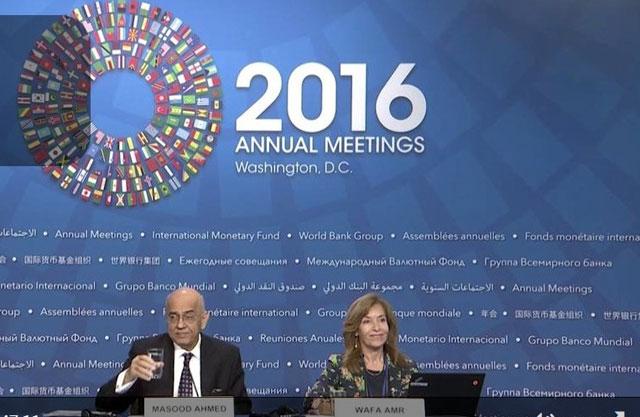You are here
IMF praises Economic Policy Council recommendations
By Omar Obeidat - Oct 09,2016 - Last updated at Oct 09,2016

Masood Ahmed, director of the IMF Middle East and Central Asia Department, speaks at a press conference in Washington, DC, on Friday (Photo courtesy of IMF)
AMMAN – The International Monetary Fund (IMF) on Friday said the recommendations made by the Economic Policy Council (EPC) last month are growth-oriented and aimed at enhancing the competitiveness of the private sector.
Masood Ahmed, director of the IMF Middle East and Central Asia Department, said the task facing Jordan now is to accelerate growth and increase the functioning and competitiveness of the private sector, adding that many of the recommendations go in that direction.
Ahmed made the remarks during a press conference at the IMF headquarters in Washington as he was giving a press briefing on the 2016 Economic Outlook for the Middle East and Central Asia, on the sidelines of the annual IMF-World Bank meetings.
The official was responding to a question on whether the EPC's recommendations go in line with the Extended Fund Facility programme the fund has recently approved for Jordan.
"I see this as a very welcome instrument that has been created by the Jordanian authorities, precisely to bring together all of the different ministries and different government and other departments whose inputs are required to take action on the business environment issues that have held back the pace of growth in Jordan," he said, adding that Jordan is taking major efforts to bring its macroeconomic imbalances into better control.
On September 7, His Majesty King Abdullah headed the EPC meeting, during which the first set of recommendations by the council to aid the government in surpassing economic obstacles and boosting the national economy were announced.
The recommendations were made in cooperation and coordination among the sub-committees of the council and the concerned government parties, which were approved according to an executable and practical programme.
On the same day, the Cabinet adopted the 38 recommendations made by the council, announcing that the suggested plans would go into effect immediately after making the necessary arrangements.
The recommendations include continuing work to establish a Jordanian fund for entrepreneurship at a cost of $100 million and having the Central Bank of Jordan increase the upper limit of loan guarantees for start-ups from JD50 million to JD100 million.
They also include establishing a private equity fund to be owned by Islamic and commercial banks.
A major plan is to transform Amman Stock Exchange into a public shareholding company.
They also included amending the law governing the Jordan Securities Commission and the Companies Law to delegate more authorities to the commission, and enable it to issue the necessary regulations to introduce new investment tools and encourage further investments.
The EPC already decided to form several sub-committees specialised in the field of economic legislation, taxes, customs, refunding and entrepreneurship, transpiration trade and business environment, the statement said, adding that the sub-committees include members of the EPC as well as the concerned ministers.
His Majesty ordered in June the formation of the EPC, whose mandate is to discuss economic policies, programmes and development plans.
Functioning under the direct supervision of the King, the 15-member body is also tasked with identifying the main constraints holding back economic growth and propose solutions to overcome them.
Related Articles
AMMAN — Industry, Trade and Supply Minister Yarub Qudah on Saturday said the government is studying a move to unify the customs and sales ta
AMMAN — His Majesty King Abdullah on Wednesday headed the Economic Policy Council (EPC) meeting, during which the first set of recommendatio
AMMAN — The Cabinet is expected to discuss and set the mandating reasons for a new income tax law before the bill is posted online for peopl

















